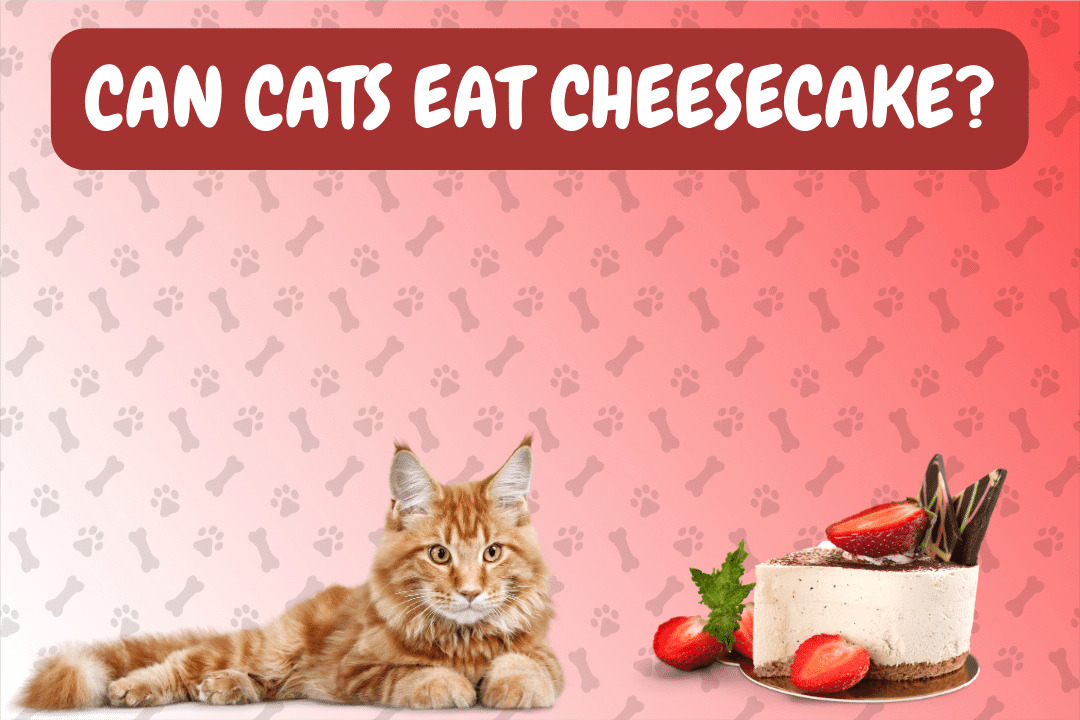No, cats can’t eat cheesecake, because it contains ingredients that are harmful to them.
Table of Contents
Introduction
Cheesecake, with its creamy texture and rich flavors, is a delightful dessert enjoyed by many. As cat owners, it is good to know can cats eat cheesecake? However, it’s essential to understand that not all human foods are safe for cats. In this article, we’ll explore why cheesecake is not suitable for cats, also we will discuss about its nutritional value, potential risks, and offer alternatives to keep your furry friend safe and healthy.
Nutritional Value
Cheesecake is primarily made from cream cheese, sugar, and often includes ingredients like eggs and vanilla. While these ingredients may be suitable for humans, they do not align with a cat’s dietary needs. Cats are obligate carnivores, and their diet should consist primarily of high-quality protein from meat sources. Cheesecake doean’t provide the essential nutrients required for a cat’s well-being and may contain big amounts of sugar and fat, which are not part of their natural diet.
Potential Risks
Feeding cheesecake to your cat can be very risky. The high sugar content in cheesecake can lead to weight gain, diabetes, and dental issues in cats. Additionally, the rich, creamy texture can be difficult for cats to digest and may result in digestive upset, including diarrhea and vomiting.
How to Serve Safely
The best option for your cat is to not give it cheesecake. It’s crucial to keep human desserts, especially those high in sugar and fat, away from your cat. It is better to focus on giving your cat balanced and nutritionally cat food that meets their specific dietary requirements.
Serving Suggestions
If you’re looking for a special treat for your cat, you can try commercially available cat treats or small portions of plain cooked chicken or fish. These treats are formulated to meet your cat’s nutritional needs and are a safe way to offer something special without the risks associated with human foods like cheesecake.
Special Considerations
It’s important to be aware of any specific dietary restrictions or allergies your cat may have. Some cats may have sensitivities to certain ingredients, so always monitor their response to new foods and treats.
Expert Opinion
Veterinarians and experts unanimously advise against feeding cheesecake to cats due to its high sugar and fat content and the potential risks associated with it. Cats have specific dietary needs that should be met through high-quality cat food designed to provide all the necessary nutrients for their health.
Conclusion
In conclusion, cats should not be offered cheesecake as it contains ingredients that are harmful to them. The high sugar and fat content can lead to various health issues, and cheesecake lacks the essential nutrients required for a cat’s well-being. To ensure your cat’s health and happiness, stick to a diet specifically designed for cats and avoid sharing human desserts like cheesecake.
FAQ
Q1: Can cats eat cheesecake in small quantities?
A1: No, even in small quantities, cheesecake is not recommended for cats due to its high sugar and fat content.
Q2: Are there any dairy products that cats can safely consume?
A2: While some cats can tolerate small amounts of plain yogurt or lactose-free milk, it’s best to consult with your veterinarian before introducing any dairy products into your cat’s diet.
Q3: Can cats eat other desserts like ice cream?
A3: No, desserts like ice cream are not suitable for cats. They often contain dairy and sugar, which can be harmful to them.
Q4: What should I do if my cat accidentally consumes cheesecake?
A4: If your cat accidentally consumes cheesecake or any other potentially harmful food, contact your veterinarian immediately for guidance.
Q5: Can cats eat cheesecake if it’s sugar-free?
A5: Sugar-free cheesecake may contain artificial sweeteners like xylitol, which are toxic to cats. It’s best to avoid offering any type of cheesecake to your pet.
Q6: Can I give my cat a small taste of cheesecake as a treat?
A6: It’s not advisable to offer cheesecake, even in small amounts, as a treat for your cat. Stick to cat-specific treats that are designed for their nutritional needs.
Q7: Can cats eat cheesecake crust without the filling?
A7: While the crust may be less harmful than the filling, it’s still not suitable for cats. It’s best to avoid offering any part of cheesecake to your pet.
Q8: Are there any health benefits to feeding cheesecake to cats?
A8: There are no health benefits to feeding cheesecake to cats, and it can pose significant health risks due to its high sugar and fat content.
Q9: Can cats eat cheesecake if it’s homemade with natural ingredients?
A9: Even homemade cheesecake with natural ingredients is not recommended for cats. Their dietary needs are best met through high-quality cat food formulated for their specific requirements.
Q10: What should I do if my cat shows signs of digestive upset after consuming cheesecake?
A10: If your cat experiences digestive upset after consuming cheesecake or any other unusual food, consult with your veterinarian for guidance on how to address the issue and ensure your cat’s well-being.
For more food information about what Cats can or can’t eat, read our blog.
Hello! I’m Max Walley, a pet enthusiast who knows a lot about what our animal buddies can munch on and what’s a no-no. With ‘canpeteat.it,’ I’m here to help pet owners make smart food choices. Come with me as we dive into the world of pet nutrition, discovering what keeps our furry pals joyful and in tip-top shape. Let’s explore this adventure together!


